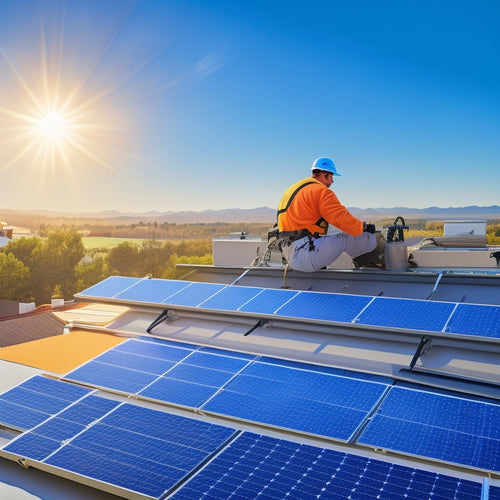
What to Know Before Installing Home Solar and Battery Storage
Share
Before installing home solar and battery storage, you'll want to assess your energy needs, considering peak usage periods and overnight consumption. This informs your solar panel choice, with options ranging from efficient but pricey monocrystalline to affordable thin-film panels. You'll also need to select a compatible battery storage system, evaluating factors like cost, energy density, and lifespan. Installation and maintenance costs, as well as available incentives and financing options, must also be factored in. By understanding these key aspects, you'll be well on your way to a seamless integration of solar and battery storage - and there's more to uncover about making this technology work for you.
Key Takeaways
- Assess your energy needs by analyzing consumption patterns to determine peak usage periods and identify the right solar and battery storage solutions.
- Choose the right solar panel type based on energy needs, budget, roof space, warranty, durability, and maintenance requirements.
- Select a suitable battery storage system that integrates with your solar panels, considering factors like compatibility, monitoring, and control of energy flow.
- Factor in installation, permit, inspection, and maintenance costs, including regular software updates and hardware checks, into your overall budget.
- Research and compare financing options, including government incentives, local rebates, and special promotions, to find the best fit for your budget and energy objectives.
Assessing Your Energy Needs
Evaluating Your Energy Needs
Most households consume a significant amount of energy, and understanding your specific needs is essential when reflecting on home solar and battery storage.
To accurately evaluate your energy needs, you'll need to analyze your energy consumption patterns. This involves identifying your peak usage periods, which typically occur during the morning and evening when lights, appliances, and HVAC systems are in use.
You'll also want to contemplate your energy usage during the night, when some appliances may still be running.
Understanding Solar Panel Options
Understanding Solar Panel Options
Three primary types of solar panels are available for homeowners: monocrystalline, polycrystalline, and thin-film. Each type has its advantages and disadvantages. Monocrystalline panels are the most efficient, with efficiency ratings ranging from 15% to 20%. They're also the most expensive.
Polycrystalline panels are a more affordable option, with efficiency ratings between 12% and 15%. Thin-film panels are the least efficient, with ratings around 7% to 14%, but they're also the cheapest.
When choosing a solar panel type, you should consider your energy needs, budget, and available roof space. If you have limited space, monocrystalline panels might be the best option. If you're on a tight budget, thin-film panels could be the way to go.
It's crucial to research and compare the different solar panel types to determine which one is right for you. You should also consider the warranty, durability, and maintenance requirements of each type before making a decision.
Battery Storage System Basics
As you consider integrating a home solar system, you'll likely want to investigate the benefits of pairing it with a battery storage system. This combination allows you to store excess energy generated by your solar panels during the day for use during the night or when the grid is down.
When evaluating battery storage systems, you'll encounter different battery types, each with its strengths and weaknesses.
| Battery Type | Characteristics |
|---|---|
| Lead-Acid | Inexpensive, well-established technology, but heavy and less efficient |
| Lithium-Ion | High energy density, long lifespan, but more expensive |
| Sodium-Ion | Lower cost, similar performance to Lithium-Ion, but still developing |
System integration is also essential, as it determines how seamlessly your solar panels, battery storage, and grid connection work together. Consider factors like compatibility, monitoring, and control systems to guarantee a smooth and efficient energy flow. By understanding these basics, you'll be better equipped to choose the right battery storage system for your home solar setup.
Installation and Maintenance Costs
You've narrowed down your battery storage system options and are now ready to evaluate the installation and maintenance costs associated with your chosen system.
The installation timeline typically ranges from a few days to a few weeks, depending on the complexity of the system and the installer's workload. Be certain to ask your installer for a detailed project schedule to plan accordingly.
Maintenance frequency will also impact your overall costs. Most battery storage systems require regular software updates and occasional hardware checks to guarantee peak performance. Some systems may require more frequent maintenance, such as monthly or quarterly checks, while others may only need annual maintenance.
Understand the maintenance frequency and associated costs to incorporate them into your overall budget.
When evaluating installation and maintenance costs, consider the following: the cost of the installation itself, any necessary permits or inspections, and the cost of maintenance over the system's lifespan.
Be certain to ask your installer about any warranties or guarantees that may be included, as well as any potential maintenance or repair costs down the line.
Incentives and Financing Options
Government incentives and private financing options can greatly offset the upfront costs of your home solar and battery storage system. You can claim federal incentives, such as the Solar Investment Tax Credit (ITC), which allows you to deduct 26% of the total system cost from your taxes. Additionally, you may be eligible for local rebates and incentives offered by your utility company or state government.
When it comes to financing options, you have several choices. You can purchase the system outright, finance it through a loan, or enter into a leasing agreement. Many financing options offer flexible repayment terms and competitive interest rates.
Some lenders also offer special promotions or discounts for energy-efficient upgrades. Be sure to research and compare different financing options to find the one that best fits your budget and energy goals.
Frequently Asked Questions
Can I Install Solar Panels on a Metal or Asphalt Roof?
You'll want to guarantee your roof is compatible with solar panels, considering installation considerations like structural integrity and material durability. Metal roofs can work well, but asphalt roofs might require additional support, so it's crucial to assess your roof's condition before installation.
Will Solar Panels Affect My Home's Resale Value?
You're wondering if solar panels will enhance or bust your home's resale value. Rest assured, they'll likely increase it, especially with attractive solar panel financing options and solar installation incentives that appeal to eco-conscious buyers.
How Does Solar Energy Impact My Home Insurance Policy?
You won't be surprised to learn that solar energy can actually decrease your insurance premiums, as it's considered a safety feature; many insurers offer policy discounts for homes with solar panels, and your insurance coverage will likely remain unaffected.
Can I Use Solar Power During a Grid Outage Without Batteries?
You can't use solar power during a grid outage without batteries, as your system is designed to shut down for safety reasons; however, with a battery storage system, you'll enjoy grid independence and ideal solar power efficiency when the grid goes down.
Are Solar Panels Resistant to Hail and Extreme Weather?
You're wondering if solar panels can withstand Mother Nature's fury? Well, rest assured, most modern solar panels are built to resist hail damage and boast impressive weather durability, with some even surviving tennis-ball-sized hail at 70 mph!
Conclusion
You've made it to the final step of your solar expedition! Now that you've assessed your energy needs, chosen the right solar panels, and understood battery storage systems, you're ready to utilize the power of the sun. Did you know that in 2020, the US solar market grew by 43% compared to the previous year? With the right knowledge and incentives, you can join the thousands of homeowners already benefiting from clean energy. Get ready to save money, reduce your carbon footprint, and enjoy energy independence!
Related Posts
-

What You Need to Know About Permits and Inspections
You need to navigate the complex landscape of permits and inspections to guarantee your project complies with local z...
-

What Are the Average Cost Savings of Solar Panels
You can expect to save between $400 and $1,000 per year on your electricity bills with solar panels, which translates...
-

3 Essential Steps for Solar Electricity Installation
To guarantee a successful solar electricity installation, you'll need to follow three essential steps. First, assess ...


